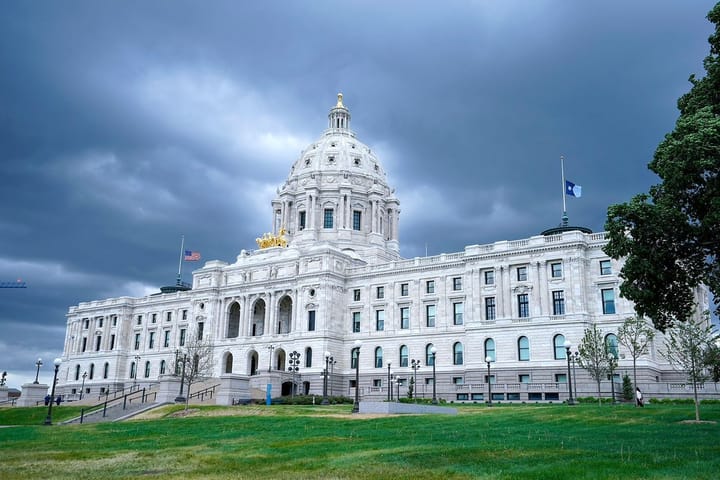US Supreme Court turns down push by states to challenge Biden deportation policy

By Ariana Figueroa, Minnesota Reformer
WASHINGTON — The U.S. Supreme Court on Friday overwhelmingly ruled that Texas and Louisiana lacked the legal standing to challenge the Biden administration’s deportation guidelines, granting a win to the White House on immigration policy.
The states objected to the White House’s directive to the U.S. Department of Homeland Security to prioritize arresting and deporting noncitizens who have recently crossed the border without authorization and noncitizens who pose a threat to public safety.
The White House wanted those guidelines in place rather than a focus on deporting the millions of undocumented people who have lived in the U.S. for years — a departure from a Trump-era policy.
In an 8-1 decision in the case, United States v. Texas, Justice Brett Kavanaugh wrote the opinion for the majority, calling the suit Texas and Louisiana brought “an extraordinarily unusual lawsuit.”
“They want a federal court to order the Executive Branch to alter its arrest policies so as to make more arrests,” Kavanaugh wrote. “Federal courts have not traditionally entertained that kind of lawsuit; indeed, the States cite no precedent for a lawsuit like this.”
There are an estimated 11 million undocumented people in the U.S. who have lived in the country for years and sometimes decades. In the DHS guidelines, Secretary Alejandro Mayorkas said the agency did not have the resources to deport every undocumented person in the nation.
Kavanaugh was joined by Chief Justice John G. Roberts Jr., and the court’s three liberals, Justices Sonia Sotomayor, Elena Kagan and Ketanji Brown Jackson.
Justices Clarence Thomas, Neil Gorsuch and Amy Coney Barrett also agreed, but for different reasons. Justice Samuel Alito Jr. was the lone dissent.
“DHS looks forward to reinstituting these Guidelines, which had been effectively applied by U.S. Immigration and Customs Enforcement (ICE) officers to focus limited resources and enforcement actions on those who pose a threat to our national security, public safety, and border security,” Mayorkas said in a statement following the decision.
“The Guidelines enable DHS to most effectively accomplish its law enforcement mission with the authorities and resources provided by Congress.”
States and feds
During oral arguments in November, Judd Stone, the solicitor general with the Texas attorney general’s office, argued that the federal government is required by U.S. immigration law to deport any undocumented immigrant, regardless of a lack of resources.
Elizabeth B. Prelogar, solicitor general with the Department of Justice, argued that the Biden administration’s memo does not ignore enforcement laws, but is “prioritizing limited resources” in its enforcement measures.
Muzaffar Chishti, an attorney and director of the Migration Policy Institute office at New York University School of Law, said in an interview with States Newsroom that the court’s decision “has certainly put a dent in the ability of states to bring any action against the federal government on immigration.”
“Whether the standing principles today that the Supreme Court has laid out will apply equally in all future (cases) that states bring to the Supreme Court, we don’t know,” he said.
Lena Graber, senior staff attorney for the Immigrant Legal Resource Center, said in a statement that the decision should “shut down further attempts by states from suing the federal government whenever they do not like a federal policy.”
Graber said the ruling affirms that the Biden administration has the “discretion to determine when to arrest or deport immigrants and when not to.”
“Now, the Biden Administration must reinvest in prosecutorial discretion and prioritize ending immigration arrests, detention, and deportations,” Graber said. “The Biden Administration must stop the destructive impact that policing, surveillance and immigration enforcement and detention has on communities.”
Agent discretion
The guidelines were first issued in 2021, and the White House gave U.S. Immigration and Customs Enforcement agents discretion on whether enforcement actions were needed. ICE agents were told to focus on noncitizens who were suspected terrorists, had already committed crimes or were recently arrested at the border.
“In exercising our discretion, we are guided by the fact that the majority of undocumented noncitizens who could be subject to removal have been contributing members of our communities for years,” according to the memo written by Mayorkas.
“They include individuals who work on the frontlines in the battle against COVID, lead our congregations of faith, teach our children, do back-breaking farm work to help deliver food to our table, and contribute in many other meaningful ways,” he continued. “The fact an individual is a removable noncitizen therefore should not alone be the basis of an enforcement action against them.”
Texas sued and a Texas district court judge halted the policy, determining that it violated federal policy. The Biden administration appealed, but a unanimous three-judge panel of the U.S. Court of Appeals for the 5th Circuit in New Orleans kept the block in place.
The Biden administration submitted an emergency appeal to the Supreme Court to block the ruling by the Texas judge, Drew B. Tipton, a Donald Trump appointee. The justices then voted 5-4 to keep the policy on hold until the case could be heard last year before the court.
Jeremy McKinney, the former president of the American Immigration Lawyers Association, said in an interview with States Newsroom that the Supreme Court’s decision made it clear that Texas did not have standing.
He said that eight justices agreed that the court could not remedy the harm, known as redress, and therefore the states don’t have standing.
“They basically said that the courts can’t fix this problem, Texas, it’s a policy dispute, and that’s something that you settle through the political process and not in court,” he said.
McKinney added that the decision could play into another immigration-related case that will determine whether a program to protect undocumented people brought without authorization into the country will be protected.
Those more than 500,000 undocumented people referred to as Dreamers are currently waiting for a Texas judge to determine whether the Deferred Action for Childhood Arrivals program is legal. It’s a case that many immigration attorneys are expecting to make its way to the Supreme Court by 2024.
Minnesota Reformer is part of States Newsroom, a network of news bureaus supported by grants and a coalition of donors as a 501c(3) public charity. Minnesota Reformer maintains editorial independence. Contact Editor Patrick Coolican for questions: info@minnesotareformer.com. Follow Minnesota Reformer on Facebook and Twitter.



Comments ()